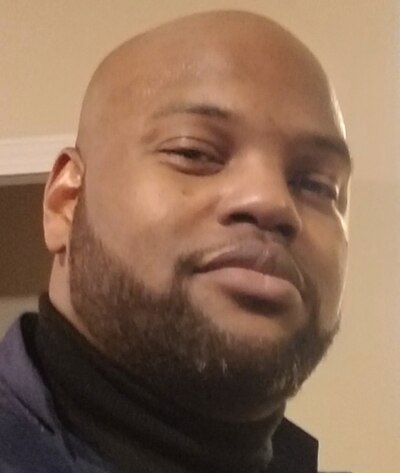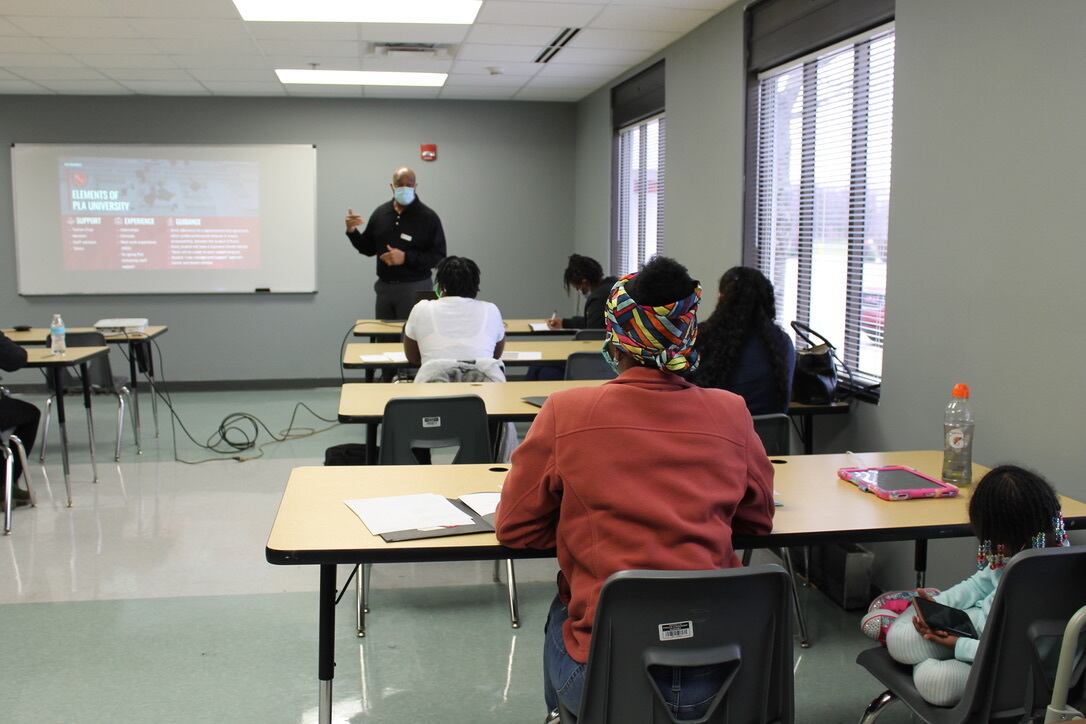In the first few lessons of his English and social studies classes, Christian Young focuses on welcoming his adult students back to school. For many of them, this is the first time they’ve stepped into a classroom in years.
For Young, endearing students to class assignments and term papers starts with an autobiographical essay, an exercise that focuses on the student’s life. Not only does it allow him to gauge their writing skills, but it “gives me a window into them as people,” Young said.
He added: “I continue to pay attention to them throughout the year and find plenty of ways to incorporate their likes and dreams into the lessons.”
In March, he was named Adult Educator of the Year by the Michigan Reading Association.
Young didn’t have his heart initially set on teaching. He earned a degree in journalism and, upon graduating in 2007, found “slim” opportunities in the field. While taking up freelance reporting opportunities, Young “began subbing to pay the bills, but I ended up enjoying it, so I suppose I was always leaning that way.”

He returned to school to pursue a master's in secondary education and English as a Second Language. While working toward his degree, Young began teaching English classes at a Detroit high school in 2014. From there, he continued to find teaching jobs around the city before taking a full-time job with the Detroit Public Schools Community District’s Adult Education program in 2018.
In recent years, the Detroit district has prioritized restructuring its GED program. It has collaborated with Detroit at Work to offer Detroiters without a high school diploma or GED a chance to go back to school.
Young talked to Chalkbeat about his approach to teaching adult students, how he brings current events into the classroom, and the advice that he holds on to.
This interview has been lightly edited for length and clarity.
What drew you to adult education?
I had always had an interest in building literacy in adults. Up until that point, I had taught middle and high school English, a lot of times in alternative school settings. I went to a [Detroit district] job fair, and someone asked if anyone was interested in teaching adult education classes, and I raised my hand. I had a great interview with (then Adult Education Principal) Dr. Dedria Willis, and it just went from there.
But ultimately, it was not so much what inspired me to go into adult education but who. My mother had my oldest sister and my brother by the time she was 17, and she dropped out. She soldiered on to get her GED, and continued to get her bachelor’s, master's, and had just completed her doctorate before she passed this past September. Having her as an example truly served as an inspiration for me to not only go into adult education, but into education period.
Did you assume that the same teaching skills would carry over? How did you have to adapt your teaching methods?
I was actually surprised to see, just pedagogy and strategy-wise, how little I did have to adjust. I’ve always been a hands-on, visual-kinesthetic type of teacher, and I know that that’s how anyone learns. I did have to adjust some things here and there, but ultimately, I had a little more license to make things more relatable and exciting, and that’s always the key to good teaching and learning, regardless if the student is 6 or 60.
How do you get to know your students?
I usually open the year by giving them a writing assignment off the bat — an autobiographical essay. It not only allows me to gauge their skills but, more importantly, gives me a window into them as people. As the year goes on, I continue to pay attention to them throughout the year and find plenty of ways to incorporate their likes and dreams into the lessons. I also share a bit of myself in conversation because there must be that when building relationships with students. One way I connect with my GED students is by telling the story of my mother, who herself dropped out as a teenage mother but persevered to get her GED and eventually earn her Ph.D. and become a college professor.
Tell us about a favorite lesson to teach. Where did the idea come from?
There’s so many that I love. In ELA, I actually enjoy teaching about arguments, claims, and evidence for the GED essay. It teaches them to really analyze and break down an argument and evaluate the strength of the claim and evidence, and we see how it’s applicable to daily life. In social studies, we’re wrapping up an economics unit right now, and the students are creating business plans and doing “Shark Tank”-style presentations. I love that because it not only gets them thinking about economic principles, but they’re also flexing their persuasive speaking and writing muscles, incorporating data and numbers, and doing plenty of research. It hits all subjects, and it’s extremely relevant because it’s totally student-centered. I also enjoy teaching about government and even giving them some history they may not have gotten in schools before.
What’s something happening in the community that affects what goes on inside your class?
The vast majority of my students are parents themselves, with children in [Detroit public schools] and other school systems. I have one social studies lesson where they imagine that they are running for mayor and pick a major issue to focus on as the focal point of their campaign, and even have had a couple of students participate in a roundtable discussion with former City Councilman Roy McCalister.
Since the majority of my students are parents with children in the school system, I continually implore them to get involved by attending their school meetings and board meetings, not just as parents but as students of the adult education program. They have unique perspectives that can serve them, their children’s schools, and their families.
Tell us about a memorable time — good or bad — when contact with a student’s family changed your perspective or approach.
I initially was a hardcore stickler on deadlines and behavior — still am to an extent. But when I learned about what a particular student was going through at home and yet still made it to class every day, it taught me that, sometimes, grace is necessary. I am reminded of that every day with my adult students. Despite their responsibilities and the things they face, they make it there every day. So, I owe them my best.
What was your biggest misconception that you initially brought to teaching?
I always knew it was going to be hard work, but I didn’t know just how hard it would be. Add to that, I wasn’t fully aware of all of the rules, regulations, and rigamarole rampant in academia. You must do this; you can’t do that. But I am finding ways to work within those rules while still being creative and making my lessons relevant.
Recommend a book that has helped you become a better teacher.
I remember my mother gave me the book “The Dreamkeepers: Successful Teachers of African American Children” by Gloria Ladson-Billings. It really reinforced a lot of my views of teaching and finding the best in every student, whether adult or child.
What’s the best advice you’ve received about teaching?
If you really have a passion for it, go for it and stick with it, and don’t tolerate anyone trying to derogate you or your profession. Hang in there; it gets better. Read, read, READ. Always work at your craft. Network with fellow educators that YOU CLICK WITH (I need to emphasize that part). A great administrator and supportive colleagues are worth their weight in gold. If you can back it up — say you just taught a great lesson or got recognized for something — then toot your horn and talk your stuff. Never play small, never settle for less than what you want, and always give your best to yourself, so you can give your best to your students.
Ethan Bakuli is a reporter for Chalkbeat Detroit covering Detroit Public Schools Community District. Contact Ethan at ebakuli@chalkbeat.org.








